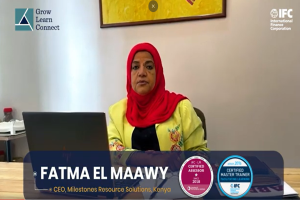Thriving in Permacrisis Using Coaching Strategies
The term "permacrisis" gained prominence after being named Collins' 2022 Word of the Year. Permacrisis refers to prolonged instability and insecurity across various aspects of life, encompassing environmental degradation, socioeconomic inequality, political upheaval, health pandemics, and more. Permacrisis, in contrast to conventional crises with definitive responses, is a persistent and evolving terrain of disruptions that demands innovative approaches and transformative thinking to traverse and surpass.
Thriving amid permacrisis requires unique skills and approaches, and coaching strategies have emerged as invaluable tools to survive and thrive in the face of continuous challenges. Research by PwC shows that companies with resilient employees experienced 41% higher revenue growth during the COVID-19 pandemic (PwC, 2020). Leaders can steer their teams towards resilience, adaptability, and sustainable growth by empowering individuals with coaching principles, techniques, and mindsets and fostering a coaching culture. Adaptive leaders respond effectively to evolving challenges and capitalize on opportunities for innovation and improvement. (Harvard Business Review, 2011).
PwC’s Global Crisis and Resilience Survey 2023 shows that 57% of organizations cite upskilling future leaders as one of their three most important elements of future-proofing resilience. Leaders must handle the complexities of the crisis while also preparing the workforce for potential future challenges to thrive during workplace or organizational crises. Coaching skills have become essential tools for developing emotional intelligence, resilience, and adaptability in the workforce, equipping individuals not only to adapt but advance regardless of challenging circumstances.
Fostering a culture of continuous learning and transformative innovation equips organizations to endure crises and emerge stronger, more agile, and prepared to face new challenges. Coaching strategies play a profound role in guiding workplaces and organizations to thrive amid crises. Three key coaching strategies include:
Team Coaching
Team coaching is a comprehensive and systemic approach to support a team to maximize their collective talent and resources to accomplish the work of the team. Team coaching is an experience that allows a team to work towards sustainable results and ongoing development. It requires a skilled coach working with a team of participants to recognize strengths, address challenges, and create plans for better efficiency. The team coach acts as a facilitator, assisting team members in realizing their potential to improve team dynamics. Team coaching is crucial for organizations to foster resilience, adaptation, and sustainable growth in a world that is changing rapidly. Coached teams excel in challenging times by developing emotional intelligence and a growth mindset. They foster agile decision-making through openness to change while enhancing collaborative and creative resource utilization. By investing in team coaching and collaboration, you can ensure your organization's long-term success and sustainability.
Group Coaching
The focus of group coaching is on promoting personal growth within a group context. The main emphasis is on empowering individuals to accomplish their unique goals, develop skills, and overcome challenges. Although the process is facilitated by the group coach, each member may have distinct objectives. In a group coaching environment, a supportive environment is created where group members can share their experiences, challenges, and insights with each other.
Within the safe space of group coaching, individuals are more likely to experiment with new ideas and approaches, promoting adaptability to evolving situations. Rather than seeing change as a threat, group coaching helps members embrace it as an opportunity for growth. With the help of group coaching as a strategy to thrive in permacrisis, group members are encouraged to develop long-term strategies rather than short-term fixes, which facilitates sustainable growth.
Coaching for Managers and Leaders
As the world faces a perpetual crisis, coaching for managers and leaders is a powerful tool for nurturing effective and inspiring leaders. Leadership coaching is tailored to individual needs, helping aspiring managers and leaders recognize and enhance their unique strengths and areas for improvement. According to a report by the Chartered Institute of Personnel and Development, organizations with effective coaching programs experience enhanced leadership and management practices. Coaching for Managers and Leaders is a powerful and transformative approach that nurtures individuals' leadership skills and qualities. The benefits are significant in these ways:
- Improve team performance: Team performance is significantly enhanced. Coaching skills allow managers and leaders to motivate and optimize team dynamics, ensure collaboration, maximize team members' potential, and guide their teams toward shared goals.
- Creation of Inclusive and Transformational Leaders: Coaching for Managers and Leaders cultivates inclusive and transformational managers and leaders who value diversity, respect different perspectives, and foster an innovative and inclusive work culture.
- Adapting to Change: Adaptive leadership is vital for success in permacrisis. Coaching for Managers and Leaders helps managers and leaders embrace change, navigate uncertainties, and lead their teams through challenging times, resulting in resilient and high-performing teams.
- Reduce turnover rates: It reduces employee turnover by enhancing managers' emotional intelligence, communication, and people management skills, leading to greater responsiveness to team members' needs and concerns.
Coaching empowers managers and leaders to take ownership of their growth and become transformational, inclusive, and adaptable leaders with a distinct team-focused vision. Coaching for Managers and Leaders fosters self-awareness, communication style, and emotional intelligence, helping them understand their leadership style, and how they impact others. Overall, coaching for managers and leaders is valuable for building outstanding managers who motivate, direct, empower their teams, and achieve extraordinary results.
In conclusion, coaching strategies empower individuals, teams, managers, and leaders to navigate permacrisis successfully. Organizations fostering resilience, embracing change, and investing in coaching develop stronger, more adaptive teams, poised to seize opportunities for growth and success. Coaching serves as a beacon of transformative thinking, enabling individuals and organizations to thrive amid unending challenges.





